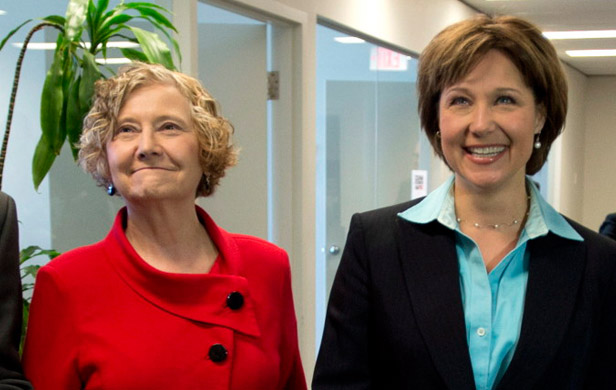
In BC, conflating environmentalism and politics is a mainstay. Is it possible to restore environmentalism in BC, free of partisan politics and more in tune with the actual environment? Here is where environmentalists can learn a lot from the rich and much longer history of the labour movement.
Much like labour, the environmental movement has hitched itself to a political party. This approach did not – and has not – served labour well as a force for progressive change, but rather doing so allowed electoral politics to marginalize the agenda of the majority of the populace, otherwise known as working people.
Interest groups, or lobbies like labour and environmentalism, are much more able to forward their cause as independent, partisan-free organizations whose sole intent is to leverage whomever is in power to make gains for their constituency. In this vein, it is of course crucial to be political, however, if such a group is already committed to a political body it impairs their ability to properly leverage gains, regardless of who is in power and what industry dominates the economic and political landscape.
The Green-industrial alliance
Environmentalism in BC has not only marginalized progressive environmental policy and the desires of BC’s majority by embedding itself in the Green Party, but in so doing has adopted Green Party politics. It should be obvious to anyone paying attention that the Green Party in BC is an enabling mechanism for the dominant industries and political players, most all of which are antithetical to what are commonly understood to be green values and policy objectives – at least, as they are advertised.

This corporate subordination of Green politics has been evident in many ways – from the Liberal Party paying for Green Party advertising during last campaign, to now-Green MLA Andrew Weaver’s support of Gordon Campbell in 2009, and now a proposed refinery and supporting oil pipeline. Vote splitting between the Greens and NDP has long enabled brown governments, while enviro campaigns focus on simple targets like Enbridge, to the exclusion of much bigger industrial objectives, LNG being a prime example.
Simple adjustments like electing environmental leaders through democratic reform of their organizations could be one small step to avert such dichotomy.
As it is, self-appointed leaders of green organizations dominate in BC and what we see are the brownest industries on earth undertaking an agenda that is anything but green – advanced under an unelected, social license machine that markets itself as “green.”
[signoff3]
This is not incidental or new or a mere inconvenience. Nor is it a tactical corporate tool such as “greenwashing” – rather it is a well-honed, long-practiced underpinning of both our corporate and social fabric. As a result, those that exploit oil, gas, timber, mineral and other resources are inextricably linked to the green movement and its lead organizations. It’s not simply a synergy or an alignment of convenience but rather they are one and the same.
The 2009 election saw a major schism within the so-called environmental community, whereby some leaders backed the Liberals in the name of climate action – over their controversial “run-of-river” program – even as the Campbell government vowed to build the Enbridge pipeline and continue developing the province’s oil and gas resources.
This result is not unlike the history of the labour movement in BC, despite labour having a more democratic footing and elected leadership – which only proves that democratic reform is but one step in the right direction. The two movements have much in common and face similar challenges, which is why it has always seemed odd to me that labour and environmentalism have been pitted against each other, often resulting in political failure for progressive people, policy and politicians.
“Economy vs. Environment” = false dichotomy
The age-old debate of “Economy vs. Environment” that has brought BC’s progressive forces to their knees is a false political construct, one foisted upon us by regressive, often conservative forces. It’s akin to suggesting to someone their car does not run because of the “air vs. gasoline” problem. While it is true that a combustion engine depends almost entirely on the air/gas mixture, these forces are not opposed but rather required to work in harmony, in the right balance, in order to perform as a finely tuned machine.
It’s pretty clear to me that we are not going to be scrapping the combustion engine that is our “global economy” anytime soon, despite it setting the world on fire – but we in BC can work to ensure the economy and environment balance is that of a well performing machine. That sort of tune-up is what BC needs and may still be within our grasp.
Democratic reforms could help solve problem
One step in that direction is to restore the autonomy of lobby groups/PACS/interest groups through law. This could include, or rather should force them to be non-partisan, while providing a framework for forwarding policy objectives and political goals that is much more defined. Doing so would help level the playing field and neuter the abuse undertaken by the powerful and privileged who manipulate perception and public opinion with front groups whose true agenda is often far removed from their public mandate.
From there, political party reforms are required. These could reinforce this notion by banning lobby groups/PACS/interest groups from holding membership blocks in political parties, while simultaneously ending their ability to finance parties. This could be achieved by funding parties solely with public dollars and capping their election marketing campaign expenditures. All of which would level the political playing field by offering each party the same access to the public with the same capacity to spread their message.
And of course, no parties should be run by the Kool Topp Guys at Hill and Knowlton or other major corporate lobbies, and especially not their election campaigns, all of which should be clearly banned in law. (By the way, the Toronto Star has just published a piece on the issue of the status and purpose of political parties that is worth a read, as is this follow-up piece by Don Lenihan).
Regardless, serious reforms are required and this is becoming more evident to the majority now. Yet, however fundamental, change is never easy, and often we see where such changes result in even worse setbacks, especially if the general trajectory is downward, which seems to be the case in North America. And certainly when they are about stripping power and privilege from those we have allowed to gain such immense and unprecedented power and privilege. Such entitlement is not easy to erase or even correct.
Saving BC means building new alliances
These are the circumstances that give rise to organizations that pander to power while working to inspire hope and change amongst the faithful and downtrodden, progressive-thinking populace. It’s a necessary component to political stability in a “capitalist” society run by oligarchs. BC’s environmental movement has not escaped this dynamic.
Labour has long gone down this road and fulfilled this role, in BC and elsewhere. Environmentalism seems to be their junior partner now, as the house of labour allowed itself to become stagnant and often irrelevant in our fast-changing world and labour market.So we see a partnering now, not one that delivers political victory but rather one that continues to sustain the oligarchical system, while working to maintain political stability by manufacturing consent.
If BC is to survive this global corporate onslaught, we need to get busy reforming the long-established mainstays of our political culture, which ranges from First Nations political bodies, through environmentalism and labour, as well as, our political parties – not to mention the media.
These are all public institutions made up of British Columbians, therefore change is within our grasp. Doing so may allow us to avert simply being manipulated by a small minority who implement their strategy in unison with influential interest groups, devising the rhetorical narrative that drives the plunder of our province.
Time is short and resistance is no longer a luxury but instead has become necessary for our collective well being.


Wow – quite the assassination attempt on Andrew Weaver. Too bad, this piece is a prime example of precisely what the author claims to be fighting against. Kevin, are you one of those NDPers who still blames Green Party vote-splitting for your demise in the last provincial election?
Hi Ron,
Its a 1200 world essay that says more about the Labour movement than the one sentence that mentions Weaver.
Besides, why would I “assassinate” Weaver? He is doing a fine job committing political suicide all on his own.
That said Ron it would be a good idea if you took a close look at the direct connections between Weaver and the ruling Liberals, his support for coastal oil refining and much of his petty partisan politics and positioning – most all of which supports the Liberals and has for many years now – the brownest government in our history.
The Green party support for coastal refining makes it very difficult to stop Enbridge replacement proposals such as one of the three known as “Eagle Spirit” that will involve not only transporting tons more oil by rail through BC but also a pipeline and the “largest” refinery in North America -, all of which will lead to offshore development and production.
Or is it that you like the idea of sacrificing our coast to oil and gas development for foreign interests? These proposals sound more “local” but such junior companies only manage the start up and approvals before selling to the majors, happens all the time.
Or maybe you support Weaver and Clark who worked on this “strategy” before being elected Premier, because the refinery is said to be “green” and its called “Eagle Spirit” instead of the “evil” Enbridge and it comes with Weaver’s “its great for the planet pragmatism” because its syncrude not dilbit…..therefor it must be good, like Unicorn tears and baby farts for BC’s rivers, streams, land and coast when it spills?
Ron I suggest you pay closer to attention to what is happening in BC and how its enabled by so called “Greens” like Weaver.